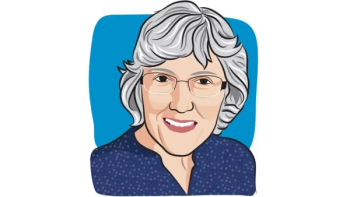
- Spring 2019
- Volume 18
- Issue 2
Despite Her Unique 'Previvorship' Experience, One Woman Shares Universal Truths
"We hope that this array of articles, while offering comprehensive information about cutting-edge treatments, will also serve as a reminder of the shared experience of those in the cancer community and the sense of connection it can bring," said Chairman and CEO, Mike Hennessy, Sr.
Maureen Boesen was in her early 20s when she found out she carried the BRCA1 gene mutation and decided to get a bilateral mastec­tomy to vastly reduce her risk of developing breast cancer.
As it is for so many other women who carry this mutation, the deci­sion to undergo surgery was extremely difficult for her, with lifelong physical and emotional consequences. Ten years later, Boesen still feels sorrow about being unable to breastfeed her children.
Imagine the depth of her dismay when, at 32, she prepared to have her ovaries and fallopian tubes prophylactically removed — to reduce her risk of
That kind of mistake — a false positive on a genetic screening test for a BRCA1 mutation — is rare. It’s so rare, in fact, that it’s pretty much unheard of. It’s still not clear how it happened and whether the test or human error was at fault, but Boesen’s column about her experience in this issue of CURE® reflects something much more universal: the concerns that haunt people who are genetically predisposed to cancer.
Worry about a shortened life span, fear of passing down a dangerous gene, sadness over physical changes — these emotions are common among this group of people, known as “previvors.” These issues are more fully explored on a website with which CURE® collaborates, Proactive Genes, where Boesen and others share not only their stories but also their advice to others walking a similar path.
Of course, the same kinds of concerns — along with many others, such as the discomfort, side effects and costs of treatment — play an enormous role in the lives of those who have cancer, and that’s why CURE® recently offered its first patient-focused meeting at the 36th Annual Miami Breast Cancer Conference®. The March 9 event helped educate, inform and equip patients and their loved ones with resources and knowledge in the breast cancer space, designed to assist them through the cancer continuum, from diagnosis through treatment and into survivorship. This issue covers some of the day’s sessions.
Also in the pages ahead, we touch on another topic driven by and for patients: self-reporting of symptoms as a way to improve treatment and outcomes. Our feature article explores a fledgling movement to create systems in the United States that allow patients to participate more in their care by reporting symptoms in real time.
We also bring you features on the latest treatments in head and neck cancer, the evidence behind cannabis for symptom relief, and the genetics that drive gastric cancer and its treatments.
We hope that this array of articles, while offering comprehensive information about cutting-edge treatments, will also serve as a reminder of the shared experience of those in the cancer community and the sense of connection it can bring.
As always, thank you for reading.
Articles in this issue
over 6 years ago
Striking a Match: Pairing Patients with Survivor Mentorsover 6 years ago
Making Lemonade: When Life Hands You a BRCA Misdiagnosisover 6 years ago
Running in the Familyover 6 years ago
Flower Power: Medical Cannabis for Cancer Side Effect Managementover 6 years ago
Settling the Stomach: Emerging Treatments for Gastric Cancerover 6 years ago
Comments From Our Readers on Recent CURE Publicationsover 6 years ago
The Road Forward for Medical Cannabis is a Complicated One


